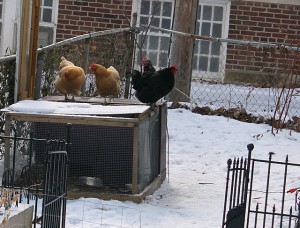 Our backyard chickens are surviving well through this winter's ice, snow, and feather-burning bulbs. They look plump and healthy and even brave cold feet to come clean up around the base of our bird feeder when there's no active participation.
But they aren't laying well. We are collecting an average of two eggs a day from our four hens in comparison to last summer's four eggs daily.
Our backyard chickens are surviving well through this winter's ice, snow, and feather-burning bulbs. They look plump and healthy and even brave cold feet to come clean up around the base of our bird feeder when there's no active participation.
But they aren't laying well. We are collecting an average of two eggs a day from our four hens in comparison to last summer's four eggs daily.
We miss the abundance of yolks and whites. We lament cooking scrambled eggs for breakfast and frittata for dinner, knowing another dozen eggs would come our way in just three days. Surely our family misses the excess we shared with them.
Chickens lay fewer eggs in winter because they are not exposed to as much sunlight and their bodies are consuming more calories to stay warm. Some backyard chicken raisers use light bulbs to stimulate production but rarely achieve the same abundance as in summer.
We are already expending energy to heat the coop on very cold nights with a heat lamp and don't want to add more to that bill. Of course, we could just buy extra eggs and we did during the holiday baking season. We agreed that it felt strange to eat someone else's eggs.
This is the reality of seasonal eating. Without electronic intervention, there are naturally fewer chicken eggs in winter.
Perhaps it's healthier for us to have fewer calorie rich eggs at our disposal during these slow winter months. When spring returns and we are digging, mowing, and otherwise working hard, our bodies will need the dense nutrition of eggs. Our taste buds will better appreciate the abundance after a period of slim pickings too.
More physical labor and eggs in summer, less in winter: a seasonal cycle that satisfies the homestead.
By the way, ever wonder what happens to laying hens when they age and aren't laying well no matter the season? Frijolito Farms, a humane chicken operation in Columbus, is considering how to have a sustainable egg laying population. Farm Wayne has come up with a generous and just solution to the problem of the ne'er laying hen.
